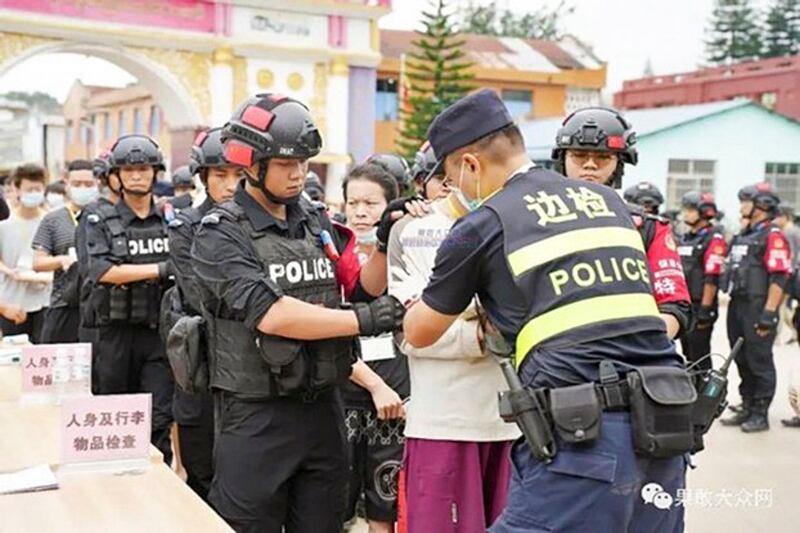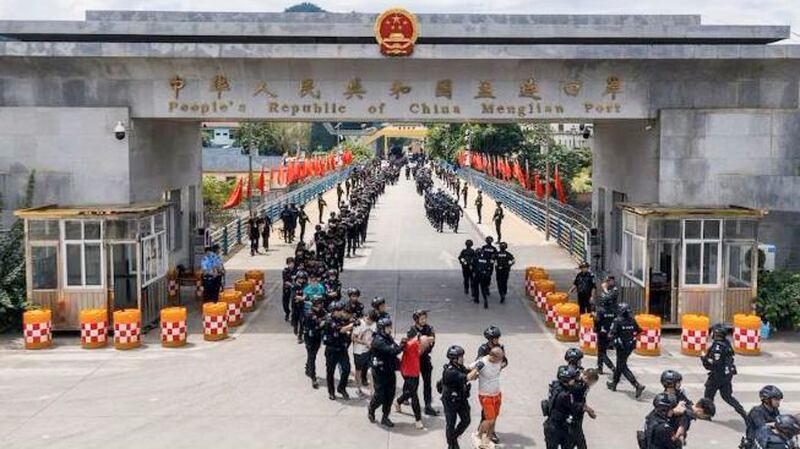Scam centers have plagued the border areas of Thailand, Myanmar and China as nationals from all three countries are tricked into – and subsequently enslaved in – online fraud. Typically, the businesses force trafficked workers to call people across Asia and convince them to deposit money in fake or fraudulent investments.
Tens of thousands involved in the criminal schemes were deported from Myanmar in 2023 by both junta and rebel army officials . Many are linked to forced labor, human trafficking and money laundering, which proliferated after COVID-19 shut down casinos across Southeast Asia.
In March, more than 800 Chinese nationals were deported from Myawaddy township's infamous gambling and scam center, Shwe Kokko, in Myanmar's Kayin state, in relation to online fraud. An investigation by RFA found that up to 3,000 foreign nationals are being held at the casino, including people from Thailand, China, Vietnam, Malaysia, Cambodia, Laos, Ethiopia and Uganda.
RFA Burmese recently spoke with Major Naing Maung Zaw, spokesperson for the ethnic Karen Border Guard Force, or BGF, which controls Myawaddy township. He said that the BGF is cooperating with China to eradicate money laundering and online scam operations in Kayin state and has vowed to evict foreign nationals involved in the activities from Myawaddy by the end of October.
This interview has been edited for length and clarity.
RFA: The Karen BGF has issued a notice to foreigners engaged in online business in the vicinity, including Myawaddy in Karen state, mandating their departure within six months. Why did you make this announcement?
Major Naing Maung Zaw: The intent is to gradually resolve the issue by prompting the departure of these people, thereby mitigating the prominence of this particular locale in the illicit [online fraud] business sector ... While the problem has recently surfaced in Myawaddy, its roots stretch both domestically and internationally over an extended period of time … So far, the situation hasn't reached a critical level, but there's increased pressure.

RFA: Since the BGF issued the notice, have any foreigners left?
Major Naing Maung Zaw: Yes, some foreigners went home. Those who came here via agents, they are secretly leaving the region.
RFA: Why is the BGF giving them six months to leave?
Major Naing Maung Zaw: Many critics … [are] dismissing this plan as mere theatrics, [since the BGF is] stretching it out to six months. While there may be some truth to their assertions, we must also consider the social implications.
We called on these companies and they came to negotiate. I have already told them that whether [their business] is legal or illegal, they must vacate the premises on their own terms … They must remove all relevant equipment from their workplaces. These factors necessitate careful consideration.
‘We don’t accept this willingly’
RFA: How many foreigners are working in these online businesses?
Major Naing Maung Zaw: That's hard to say. I prefer to have an exact number if I'm going to answer something. Currently, I think there are a few thousand.
RFA: When did these foreigners come to Kayin state?
Major Naing Maung Zaw: They arrived relatively recently. To be frank, the issue arose here not too long ago. Myawaddy is the most recent center for the [online fraud] business in Myanmar.

RFA: When they first came to Kayin state, did you try to stop them?
Major Naing Maung Zaw: We only became aware of the matter regarding [online fraud] when others drew attention to it. Our primary focus is on land leasing. Our goal is singular and simple … to embark on a new city project. We will develop our region. We have started to implement it in order to provide employment opportunities to residents.
We do not accept this [scam] situation willingly … In the past, we had restrictions on this [kind of business], and contracts were already in place. We are prepared to provide proof of the timing and terms of our contractual agreements at any time.
‘A gradual exodus’
RFA: Now that the [BGF] commanders have given them six months, they will continue to operate their businesses. What are you going to do about continued illicit activities?
Major Naing Maung Zaw: Since we made the announcement, we established a supervisory team to monitor and inspect the businesses for possible closure. It is already being implemented.
It’s important to remember that when there are thousands of people in one place, it is impossible to send all of them home in a short time ... We’re not giving them time to run their businesses. They have to pack their belongings to leave, making it logistically difficult for large groups to depart all at once. Instead, they are trickling out gradually – just a few individuals initially, gradually increasing over time. Our approach aims to facilitate a gradual exodus of these people.

RFA: The Thai and Chinese governments, as well as the U.S. government, are trying to crack down on these money scamming gangs. Are you in communication with these countries?
Major Naing Maung Zaw: We have maintained regular communication with the Chinese embassy and have been engaged in ongoing efforts. Now, the Chinese news media has also started talking about it.
We have a history of facilitating the repatriation process for foreigners, coordinating closely with the Chinese, Thai, and American embassies upon their requests via official letters ... They give us locations and we find their people. There have been a lot of cases where we have returned the concerned to the embassies with the assistance of the Myanmar police force. Our commitment moving forward is to continue to address [the issue of scam operators] domestically, ensuring the well-being of all involved parties.
Translated by RFA Burmese. Edited by Joshua Lipes and Malcolm Foster.
